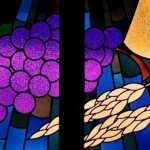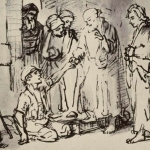Sermon \ July 12, 2015 \ Pastor Terry Defoe \ Psalm 85 \ Down, But Not Out!

Psalm 85. I’m reading verses 8 & 9:
8 I will listen to what God the Lord says;
he promises peace to his people, his faithful servants —
but let them not turn to folly.
9 Surely his salvation is near those who fear him,
that his glory may dwell in our land. (N.I.V.)
This morning, we come to the seventh Sunday in the season of Pentecost. This morning, we’re going to have a look at expectations that don’t pan out – first, ancient Israel’s expectations – and then, Jesus’ expectations – and, finally, our own. The Psalm chosen for this Sunday in the church year is Psalm 85. Bible scholars tell us that this Psalm goes back to somewhere between 600 and 500 B.C. Israel had returned from 70 years of exile in Babylon – the area we now know as Iraq. When Israel got back to their own land, things were definitely not what they expected. I pray that God would bless our consideration of His Holy Word this day.
Psalm 85 is divided into three parts. In the first part, the people of Israel remember times when God’s blessings were abundant. In the second part, they lament their present difficulties. And in the third part of the Psalm, Israel seeks God’s will for the future and prays for God’s rich blessing. Some Bible scholars are of the opinion that the three parts of this Psalm were included in a special worship service in ancient Israel. Verses one through seven – the first two parts of the Psalm – were probably spoken by the congregation. And then, in verses eight and following, a single voice – probably a prophet – speaks. The original context of the 85th Psalm could very well have been a prayer service in ancient Israel. If this is true, we are looking through the window into an ancient worship service in Israel as we consider this Psalm.
Psalm 85 describes three aspects of Israel’s existence:
- a glorious past
- a troubled present
- and an uncertain future
Let’s take a moment to talk about each of these this morning, First, a glorious past. In the first part of Psalm 85, Israel had gathered for a time of worship to do some remembering – specifically, to remember God’s great acts of deliverance. The worshiping congregation had gathered to remember the mighty acts of God – when, as the Psalm-writer said, God had restored the fortunes of Jacob and had forgiven the people their trespasses. Together in worship, the congregation recalled how God had brought their forefathers out of Egypt. They remembered how God had made a way for them to cross the Red Sea and had destroyed their enemies in the chaotic waters. Israel remembered how God had given manna to his people while they were in the desert. They remembered the time when God had given them water from a rock. They rejoiced to remember how God had made a way for his people to enter the promised land. And then, in the more recent past, they remembered how God had graciously delivered His people from exile in Babylon. As the Psalm-writer put it, in many times and in many places, God had “revived” his people. He had “covered” their sins.
In a sense, Psalm 85 is a recitation of the holy history of Israel. In pure grace, God had chosen Israel. And then, down through the years, he had continually blessed and kept them. From the very beginning, He had promised one day to send them a Messiah – a Savior – to save them and rescue them from their sins. "Love and faithfulness" are key words in this Psalm. These words summarize God's dealings with His people. One Bible scholar says:
In pure grace, God chose one family, later, one small nation tucked in a corner of the globe, and offered the rich blessing of His love and presence. In love, God offered Abraham the son he ached for, and freedom for Israel, and a throne for David.
The Hebrew word for love – some translations call it “steadfast love” – carries with it the idea of goodness and kindness. The Hebrew word for love refers to doing favors for others. It carries the idea of kindly instruction. This kind of love graciously stoops down to help those in need. Wherever this special kind of love is found, sins are forgiven. And God’s promises are kept. In Psalm 85, the people of Israel had gathered together in worship and, together, remembered – with thanksgiving – a glorious past – all made possible by God’s amazing grace. And, you know, when you think about it, as Christians gathered here in worship this day, we are doing the same thing. We, too, are richly blessed. We, too, possess the forgiveness of our sins. We have now seen what the people of Israel could only imagine – we have seen God’s promise of a Messiah – a Savior – fulfilled. As Christians, our “glorious past” is directly connected to the life, and death and resurrection of our Lord and Savior Jesus Christ. What Israel could only look forward to, we have experienced and enjoy very day.
Unfortunately, for the people of Israel, that glorious past was only a distant memory when Psalm 85 was written. The high expectations that had accompanied the people of Israel when they left the land of Babylon had been dashed. One Bible scholar says that their disappointment at the real state of things did not accord with their bold hopes for salvation. After 70 years living in a foreign land, they had finally come home. But when they got home, and when they looked around, their hearts sank. Their land had been ravaged in their absence. They now faced many years of arduous and expensive reconstruction – including the rebuilding of their beloved temple. Their crops had failed. And if that wasn’t enough disappointment, enemies now threatened them. And serious conflict had arisen from within their faith community. What they faced was a perfect storm of troubles. Their question was the eternal question of the deeply disappointed: “Is this all there is?” At this time in Israel’s history, they experienced a deep and abiding crisis of faith. They hit rock bottom.
Disappointment, of course, is a common human emotion. Things often don’t work out the way we want them to. But, when you think about it, our Savior also experienced his share of disappointments. He had clearly hoped that the Jewish religious leaders would recognize who he was and work with him in getting his message out. That didn’t happen. Jesus had hoped that the people of Israel would understand him and accept his message. That too, didn’t happen. Add to this the fact that His own disciples often misunderstood him. You know that, as the horror of the cross drew near, in the Garden of Gethsemane all of his disciples fell asleep. And then, after he was arrested, the Apostle Peter denied – not just once, but denied three times! – that he knew his Lord. After that, His disciples scattered in fear. Our Lord Jesus definitely experienced more than his share of disappointments.
Of course, for their part, the Jewish religious leaders were disappointed with Jesus, too. In many ways, their expectations of the Messiah were quite different from what Jesus was actually doing. They had noticed that He didn’t act like a king – a political king anyway. He wasn’t a strong military leader. What especially bothered them was the fact that He didn’t keep their Sabbath laws. To make things worse, He associated with women and foreigners – people the Jewish leaders avoided. Jesus didn’t support the religious status quo. For all these reasons, the Jewish religious leaders were very disappointed in Him.
So – I’ve got a question for you this morning. What do God’s people do when they are faced with major disappointments? At times like this, God’s people express their faith – they trust in the Lord. They say, “Not our will but yours be done.” They never gave up! They may be down, but they’re certainly not out!
Out of the midst of that praying congregation back in ancient Israel, somebody – probably a prophet – stepped forward and began to speak to the congregation. That prophet foretold salvation for the people. At this moment of crisis, at this moment when their faith was wavering, when they were in danger of falling into folly and doubting God’s salvation, God’s prophet intervened, directly proclaiming God’s Word in order to revive and strengthen their faith.
The third and final part of Psalm 85 brings with it reassuring Good News. Now, for the first time, we hear God’s response to Israel’s crisis of faith. Now, for the first time, we hear words of reassurance – spoken directly through God’s prophet. Now, for the first time, we hear God’s promise of peace. The word for “peace” in the Old Testament is ”SHALOM.” Shalom means more than just the absence of war. Closely associated with the word “SHALOM” are thoughts about completeness and soundness, prosperity and health, tranquility and security. As one scholar puts it:
The Hebrew word for peace – shalom – implies right relations between [one person and another], as well as between the people and their God.
In this third and final part of Psalm 85, love and truth, justice and peace are personalized. They join together in the fullness of God’s blessing. As Christians, we believe that it is only through the cross where Jesus died for our sins that God brings true peace to the world, to those who are near and to those who are far off, as the Apostle Paul puts it in Ephesians 2:17. The Apostle John writes that
“We have seen Christ's glory, the glory as of the only Son of the Father.”
For Christians, steadfast love and faithfulness meet, and righteousness and peace are united in the cross of Jesus Christ, and at the empty tomb.
An important part of Biblical faith is listening – listening to God’s Word. Psalm 85, verse 8 says:
“I will listen to what you have to say, Lord.”
W. David Buschart, Associate Dean and Professor of Theology at Denver Seminary says:
Into our cultural cacophony of endless noise, the lectionary for this week offers a piece of radical wisdom:
“I will listen,” says the Psalmist (Psalm 85:8).
Pastor Buschart says:
I wonder if the same is not true in some sense for God? I wonder how often God longs for someone who will listen to Him? Sometimes, God says things … we would rather not hear.
The Old Testament prophet Amos once had a vision of God standing next to a wall that had been built “true to plumb” — that is, perfectly straight and upright (Amos 7:7–9).
Amos then heard the Lord say,
Look, I am setting a plumb line among my people Israel; I will spare them no longer.
This, of course, refers to the Law of God. Holy places would be destroyed and a sword would be brought against God’s elect…
Sometimes, God says things we would rather not hear. That’s the Law. But not always. At other times, God brings the Gospel.
“I will listen to what God the Lord says,” says the Psalmist.
Immediately following his pledge, the Psalmist gives voice to both kinds of messages from God—those that are welcome and those he would rather not hear. Psalm 85, verse 8:
“[God] promises peace to his people, his faithful servants — but let them not turn to folly.”
According to Pastor Buschart,
The Psalmist describes this God as loving, yes, but also as righteous. In the face of our human arrogance and failure to listen, this God, he says, is capable of “fierce anger” (Psalm 85:3). This, of course, is the message of the Law.
But there is also the Gospel: God also turns away from his anger and, in “unfailing love” (Psalm 85:7), turns toward those who listen.
Those who listen to the voice of God are blessed by and become witnesses to his “love and faithfulness . . . righteousness and peace” (Psalm 85:10). God eagerly longs to “give what is good.” (Psalm 85:12)
The people of Israel saw the events that took place around them to be part of God's history of salvation. The fortunes of God’s people – including ourselves – ultimately depend on their relationship to God. All people everywhere – people of faith and people without faith, as well - experience times of disappointment. Things don’t always work out as we would like. Unintended consequences occur.
In the last few minutes, we have considered Israel’s disappointments. We have also spoken of disappointments mentioned in the New Testament, including those experienced by the religious leaders of the Jews, and even by Jesus Himself. And, of course, we think about our own disappointments, too. Psalm 85 speaks of God’s gracious intervention in the lives of his people. It describes how God’s love shines down on the earth and the earth responds. One Bible scholar says,
Just as the sun shines down from the sky and draws forth new budding life from the earth, so the righteousness of God – this term embraces the saving will of God in all its aspects – evokes faith in human beings.
God’s people – no matter the circumstances – are sustained by his amazing grace. In the 85th Psalm, God takes his people through the glories of the past, through the valley of humiliation, despair and disappointment, to the no-less-certain glories of the future. In the 85th Psalm, we are reminded again that God’s grace sustains His people, in all ages and generations. Psalm 85 presents us with an optimistic picture of life lived under God’s grace. And we respond, with the words of Mark, chapter 9, verse 24:
“Lord, I believe. Help my unbelief.”
I close with this. You may have heard it before, but it bears repeating. It’s a prayer from Sir Francis Drake, the famous British explorer who lived around the time of Martin Luther. In his prayer, Francis Drake says:
Disturb us, Lord, when we are too well pleased with ourselves, when our dreams have come true because we have dreamed too little, when we arrive safely because we have sailed too close to the shore.
Disturb us, Lord, when, with the abundance of things we possess, we have lost our thirst for the waters of life; having fallen in love with life, we have ceased to dream of eternity; and in our efforts to build a new Earth, we have allowed our vision of the new heaven to dim.
Disturb us, Lord, to dare more boldly, to venture on wider seas where storms will show your mastery; where losing sight of land, we shall find the stars. We ask you to push back the horizons of our hopes; and to push into the future in strength, courage, hope, and love."
Sir Francis Drake, explorer and naval pioneer during the Elizabethan era. Submitted by Dave Ward, Durham, North Carolina. From www.preachingtoday.com
May God bless us and keep us in the very center of his will. May he turn our disappointments into joy and enable us to serve him boldly and courageously. Amen.
Let’s Pray: DEAR HEAVENLY FATHER – Amidst the ceaseless noise of our day and age, give us eyes to see, ears to hear, and a heart to follow your voice of love. In Jesus’ most holy and precious name we pray. Amen.


